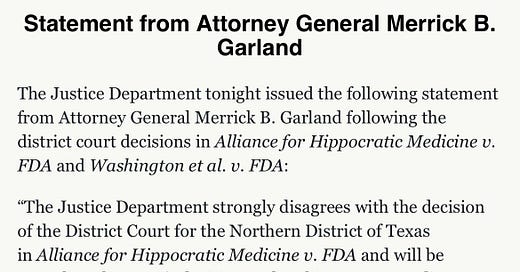On the Friday before Easter, just after the end of the workweek in Texas, a federal judge in Amarillo decided that Mifepristone, one of two key drugs used for medicated abortion, should be banned. This despite 20 years of data showing it’s safe and effective. Mifepristone has a lower rate of complications than Tylenol.
The judge also entered a stay, which means his order won’t go into effect for seven days. He did it to give the government an opportunity to appeal. But if neither the Fifth Circuit Court of Appeals, deeply conservative after a tranche of Trump appointments, nor the Supreme Court orders a lengthier extension, legal access to Mifepristone will come to an end. Not just in Texas, but nationwide.
The government didn’t need seven days. It filed its appeal to the Fifth Circuit Court of Appeals a few hours after the decision.
DOJ was prepared to file immediately because they understood the inevitable ruling in this case. Judge Matthew Kacsmaryk, who the plaintiffs judge-shopped for by filing this case in the Amarillo division where virtually all cases are assigned to him, has a background of deep antagonism to letting pregnant people make their own decisions. Kacsmaryk’s legal ruling affects the entire country, not just Texas. A federal district judge in Washington State entered a ruling ordering the FDA to keep Mifepristone on the market, just moments after the Texas ruling. But Kacsmaryk entered a nationwide injunction that rescinds the FDA’s approval of Mifepristone nationwide—even in states where abortion is still legal and without exception for the mother’s health.
That’s not the legal landscape the Supreme Court said it was creating when it ended 50 years of abortion rights under Roe v. Wade in the Dobbs case. When the Court decided Dobbs, it said decisions about whether and under what circumstances abortion should be legal would be left up to each state. But now, Judge Kacsmaryk has made that decision for all of us—you and me, for our mothers, daughters, sisters, aunts, and friends, regardless of medical necessity or our personal religious and moral beliefs. Judge Kacsmaryk knows best.
Challenged legal rulings are typically stayed to preserve the status quo while appeals work their way through the courts. But the post-Trump, uber-conservative Supreme Court has always had a different jurisprudence when it comes to abortion, permitting restrictive measures like Texas’s SB-8 vigilante-justice law to go into effect while the appeal was pending. Nothing says “result-oriented” like special rules for anti-abortion litigants (to say nothing of reversing the long-standing precedent of Roe that had worked well to balance rights and did not meet the Court’s test for when precedent should be reversed). It’s tempting to think the Court might decide the Mifepristone decision is a bridge too far, if not based on legal principles and the expectations it set when it decided Dobbs, then out of purely pragmatic political considerations some of Justice Clarence Thomas’s billionaire friends might want to see in order to avoid steep Republican losses at the polls following yet another anti-abortion decision. But it’s difficult to imagine this Court walking it back so close to its goal of extinguishing abortion rights. DOJ has strong arguments to make on appeal—compelling ones on threshold issues like whether the plaintiffs had standing to bring this case, as well as on the merits. Whether the Court will give them a fair hearing is an entirely different matter.
Soon we’ll find out if the Court meant it when it said abortion would be up to the states. Or if one judge in Texas can resurrect the long-disfavored Comstock Act and terminate people’s rights across America. The Act is an 1873 law that makes it illegal to advertise or mail anything, including information, related to preventing contraception or producing abortion (as well as outlawing sending “obscene, lewd or lascivious,” “immoral,” or “indecent” publications). The Comstock Act fell into disuse because of its effect on First Amendment rights—it involves prior restraint by the government on speech. The prohibition on materials and items related to contraception was removed after the Supreme Court’s 1965 decision in Griswold v. Connecticut, which held that Connecticut’s “mini-Comstock” law unconstitutionally invaded the privacy rights of married couples. Be concerned about where a resuscitation of this law could lead.
Restricting abortion today does not seem to be about good-faith conservative values and protecting the sanctity of life. It’s hard to believe that a party that denies access to basic medical care and education and that lets schoolkids die at the hands of mass shooters in the name of the Second Amendment is deeply committed to unborn children, unless it’s become somehow morally righteous to protect them only until they leave the womb. Ending abortion is a political rallying cry, used to bring voters to the polls and raise money, with a healthy side effect of owning uppity liberal women.
It’s really not that difficult: If you’re against abortion, don’t get one. We live in a pluralistic society and there are religions other than conservative Christianity, for instance Judaism, that command their followers to protect the life of a mother over that of an unborn fetus. Somehow their rights are now ignored, while a minority that has gained control of the Supreme Court dictates to the rest of us.
Interestingly, banning Mifepristone isn’t just part of the trend to make abortion less available; it’s also part of the trend to make it less safe and to endanger women’s lives. I spoke with Jesanna Cooper, a friend and a doctor in Birmingham, who is an experienced Ob-Gyn. She told me, “The take-home is that without mifepristone, more people will hemorrhage and/or get septic from incomplete expulsion of the products of conception.” Using Misoprostol, the other drug used in a medication abortion procedure, alone is “less effective,” she says. It involves the “same amount of pain but [is] more likely to be incomplete, which can be dangerous.” It doesn’t sound very pro-life.
More information about the two drugs, if you want to read some of the science, is here.
In 1996 then-Congresswoman Patricia Schroeder (D-CO) tried to convince the House to take the Comstock Act off the books. They didn’t. But her floor speech has resonance today. She explained that the Act was named for a man named Anthony Comstock, who “was one of these people who decided only he knew what was virtuous and right, and somehow he managed to convince all sorts of people that this was correct.” That sounds familiar.
She continued, “Anthony Comstock was a religious fanatic who spent his life in a personal crusade for moral purity—as defined, of course, by himself. This crusade resulted in the arrest and imprisonment of a multitude of Americans whose only crime was to exercise their constitutional right of free speech in ways that offended Anthony Comstock. Women seemed to particularly offend Anthony Comstock, most particularly women who believed in the right to plan their families through the use of contraceptives, or in the right of women to engage in discussions and debate about matters involving sexuality, including contraception and abortion.” We don’t need a new Anthony Comstock, and we don’t need Judge Kacsmaryk to dictate health care—or the absence of it—to people across the country.
You know what the solution is: go vote. Democrats will need sufficient majorities in both houses of Congress to restore protections for abortion. It’s not enough to win the House or the Senate; Democrats must take both to ensure access to abortion, and 2024 is not that far off.
We’re in this together,
Joyce






“Restricting abortion today does not seem to be about good faith conservative values and protecting the sanctity of life. It’s hard to believe that a party that denies access to basic medical care and education, and that lets school kids die at the hands of mass shooters in the name of the Second Amendment is deeply committed to unborn children, unless it’s become somehow morally righteous to protect them only until they leave the womb.”
With respect, every time I read something like this, my head explodes. It was NEVER about the sanctity of life. It was NEVER about moral or religious righteousness. It has ALWAYS been about men controlling and subjugating women. Period.
This decision terrifies me on so many levels. It makes no sense on the law, and it is so clearly violative of the First Amendment’s separation of church and state (although that has gone by the wayside, given this SCOTUS, with its majority of christian nationalists. How has this country imploded so quickly? I fear for my 23-year-old daughter’s health and safety. If the guns don’t get her, the religious crazies will. Vote, vote, vote!